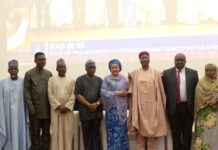
By EricJames Ochigbo
Speaker of the House of Representatives, Femi Gbajabiamila, on Tuesday advised against ‘over-regulation” of the maritime industry.
Gbajabiamila gave the advice in Abuja at the opening of a public hearing on five bills organised by the House of Representatives’ Committee on Maritime, Safety, Education and Administration.
The bills are Merchant Shipping Act (Repeal & Enactment) Bill 2021 (HB.1602) and Nigerian Maritime Administration and Safety Agency Act (Repeal and Enactment) Bill 2021 (HB.1476)
Others are, Coastal and Inland Shipping (Cabotage) (Amendment) Bill 2020 (HB.77 8), the Maritime Development Bank of Nigeria (Establishment) Bill (202?) (HB.531) and the Nigerian Maritime Administration and Safety Agency Act (Amendment) Bill 2021 (HB. 1471)
Gbajabiamila said that the Bills seek to reform and reorganise the nation’s maritime transportation industry fundamentally.
The overall objective, he said, is to ensure that the sector operates optimally.
”It is to make it more attractive to investors and better suited to meet the needs of the people who rely on the maritime industry in various ways.
“Over the last twenty years, there have been repeated efforts by the National Assembly to advance legislation to improve the operations of the industry.
“In fact, these Bills under consideration today were first enacted within the lifetime of this republic. These efforts at reform will continue even after these Bills become law.
“They will continue because as Nigeria continues to diversify our economy away from overreliance on income from the sale of fossil fuels, the shipping and maritime transportation industry represents a significant untapped resource.
“We have an obligation to advance policies and legislation to unlock the potential in that sector and maximise the potential economic benefits to the Nigerian people.
“I have long believed and expressed that the primary role of government as it relates to private industry is to facilitate the conditions that allow private capital to thrive through investment and innovation.
“In performing this role, we must be wary of over-regulation. We must be careful not to over legislate in ways that become inimical to our objectives of advancing the growth and prosperity of the industry,” he said.
Earlier, the Chairman of the committee, Rep. Linda Ikpeazu, said that the hearing is to deliberate on critical maritime sector bills referred to the Committee, by the House-in-plenary.
She said a fruitful deliberation was incomplete without the active participation and engagement of stakeholders and experts in the sector, hence the hearing.
The lawmaker said that Nigeria, by any standard, was well endowed by ocean coastline, rivers and a rich marine bio-diversity.
Sh said that the fact that the marine pedigree has not translated into a vibrant maritime industry has remained a paradox to all.
“Not only are we focused on making the maritime sector a key alternative source of revenue and economic growth to our dwindling oil resources.
“We are also poised to develop a prosperous blue economy for our nation, akin to similar successes in other maritime nations around the world.
“The fact that our marine pedigree has not translated into a vibrant maritime industry has remained a paradox to all.
“As parliamentarians charged with legislating, over sighting as well as representing the sector, we are poised to reverse this trend.
“It is in this light that this public hearing is very important. It is an avenue to tap into the views and obtain inputs of both operators and regulators, whom in any case will be at the receiving end of their implementation, and other sector experts,” she said.
The Minister of Transport, Mr Rotimi Ameachi who was represented by the Deputy Director, Legal Services, Mr Pius Oteh said the ministry is delighted of the initiative to review laws in the maritime industry.
He said that it was important to constantly review the legal framework guiding the sector, and pledged the ministry’s commitment to continue to work with the committee.
The minister, however, said that the ministry was not in support of clause 16 in the NIMASA bill which seeks to allocate 12 per cent of NIMASA revenue to the Nigeria Maritime University.
He said that in the existing law, there is a provision for NIMASA to support the university saying that increasing the percentage may affect the activities of the agencies.
He said that the initiative does not take into cognizance, the diverse functions of NIMASA which required funds.
He said that the university already enjoys funding from the national budget, Universal Basic Education among other interventionist programmers.
Speaking on behalf of NIMASA, Mr Victor Ochei who is a Director in the agency said that NIMASA aligned itself with the position of the minister. (NAN)



